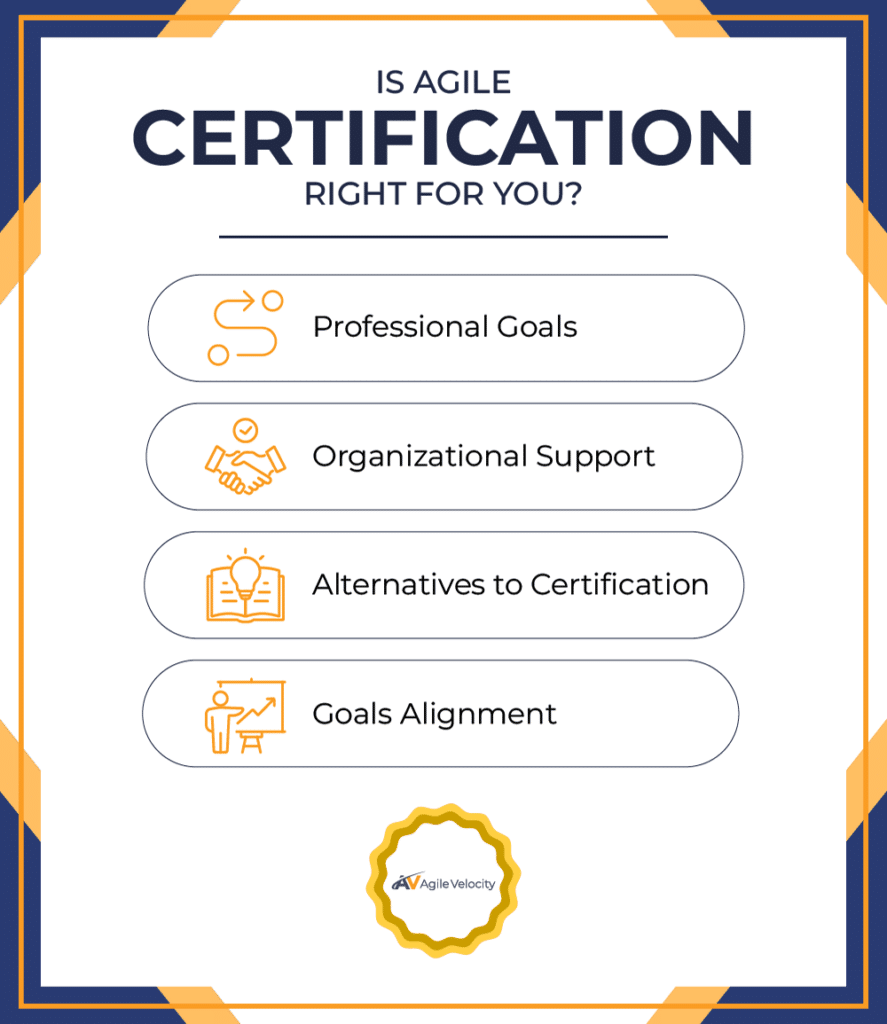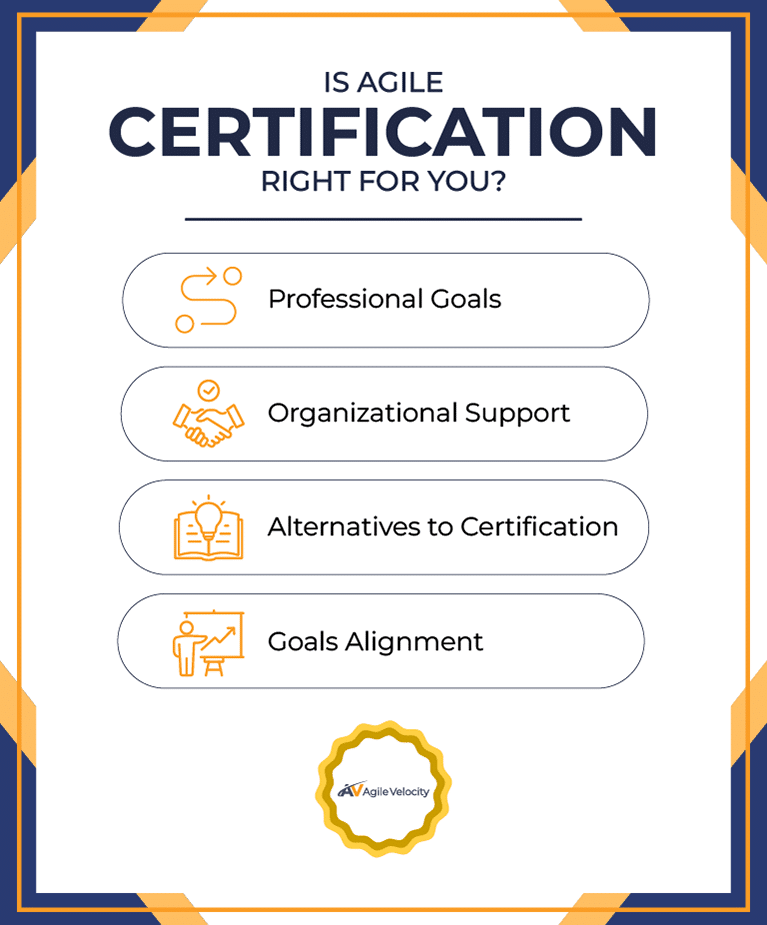In today’s fast-paced, tech-driven world, Agile principles enable teams to quickly adapt to changes, deliver consistent value, and maintain high standards of quality. For professionals, an Agile certification can be a powerful way to stand out in this space. It signals expertise in managing complexity, navigating iterative development, and fostering collaboration, all of which are important in modern industries.
However, pursuing an Agile certification prompts many questions. Is the cost justified? How much time will it take? Will it significantly impact your career trajectory or organizational goals? This article explores the tangible and intangible benefits of Agile certification, weighs the associated costs, and explains how these qualifications can enhance individual careers, boost team performance, and drive organizational agility. Whether you are a Scrum Master, Product Owner, or a leader guiding Agile Transformations, there’s plenty to consider when determining if this investment is right for you.
The Purpose of Agile Certifications
In today’s dynamic business landscape, staying Agile is essential. Agile certifications validate your ability to implement Agile Methodology effectively, from managing iterative development cycles to fostering collaboration in high-performing teams. These qualifications equip professionals with tools and mindsets crucial for success in fast-paced environments.
Obtaining an Agile certification demonstrates expertise in core principles such as iterative progress, Sprints, and collaborative decision-making. Beyond personal achievement, certifications foster a shared understanding within teams, creating consistency in language, frameworks, and Agile practices. This alignment leads to improved predictability, higher-quality outputs, and a stronger foundation for continuous improvement. Agile credentials are vital not only in software development but also in diverse fields like product management and corporate leadership, where adaptability and efficiency are paramount.
Whether you’re a Scrum Master facilitating collaboration, a Project Manager streamlining workflows, or a Product Owner focused on value delivery, an Agile certification can open new opportunities. These credentials provide credibility and equip you to contribute effectively to organizational agility and transformation efforts. For both professionals and organizations, pursuing certification is a strategic investment in growth and success.
Types of Agile Certifications Available
Agile certifications cater to various professional roles and organizational needs, covering foundational frameworks like Scrum to advanced scaling practices. Your choice should align with your career goals, team requirements, and organizational objectives. Below is an overview of some key certifications:
Scrum Master Certification
One of the most recognized credentials, Scrum Master certification validates expertise in the Scrum framework, including roles, events, and artifacts. A Certified ScrumMaster® demonstrates ability to facilitate team dynamics, foster collaboration, and guide teams toward Sprint Goals. Scrum Masters oversee Sprint Planning, Daily Scrum, Sprint Review, and Sprint Retrospective, driving continuous improvement.
You can also explore additional resources from Scrum Alliance, a pioneer in Scrum training. This certification is ideal for professionals aiming to lead high-performing teams, remove obstacles, and enhance predictability and quality in value delivery. It blends team facilitation with Agile expertise, preparing individuals for leadership roles within Agile environments.
SAFe® Certification
For organizations scaling Agile across multiple teams, SAFe® (Scaled Agile Framework®) certification equips professionals to align large groups around common goals, streamline decision-making, and synchronize activities using Agile Release Trains (ART). SAFe emphasizes Lean principles, iterative development through Planning Intervals, and alignment with business objectives.
Additionally, the official Scaled Agile site offers detailed insights about the SAFe framework. SAFe certification is valuable for leaders navigating complex environments, coordinating efforts between Product Owners, Business Owners, and stakeholders. It supports scaling Agile practices and achieving seamless integration among distributed teams.
Product Owner Certification
Product Owner certification, such as the Certified Scrum Product Owner®, is tailored for those focused on maximizing value delivery and aligning stakeholder goals with end-user needs. It prepares professionals to manage the Product Backlog, prioritize features, and translate strategic vision into actionable tasks.
You can explore this training to deepen your skills in prioritization and stakeholder collaboration. This certification emphasizes balancing user needs, technical feasibility, and business value, making it suitable for individuals leading product strategy and ensuring development teams focus on high-impact outcomes.
Lean Portfolio Management Certification
Lean Portfolio Management certifications address the need for aligning strategic goals with Agile execution. They teach professionals to balance resource allocation, manage budgets, and prioritize initiatives based on value. Unlike traditional project management, Lean Portfolio Management promotes adaptive practices and shorter feedback loops to meet evolving business needs.
For more guidance, Lean Portfolio Management training covers effective resource allocation, strategic alignment, and continuous planning. This certification is valuable for leaders overseeing resource planning and optimizing outcomes across project portfolios. It fosters efficiency, eliminates waste, and enhances value delivery through continuous evaluation and improvement.
Emerging Certifications for Specialized Roles
As Agile evolves, specialized certifications address unique industry demands. Certifications in AI-supported Agile processes integrate automation and predictive analytics into Agile workflows, enhancing efficiency and decision-making. Programs for Agile Coaches focus on mentoring teams and embedding best practices organization-wide.
Frameworks like Large-Scale Scrum (LeSS) and Disciplined Agile® (DA™) offer certifications for scaling Agile in complex environments or customizing lifecycle toolkits. For teams exploring Kanban-based workflows, certifications from Kanban University can add advanced flow-based techniques. These certifications reflect Agile’s growing sophistication and adaptability to diverse organizational challenges.
Choosing the right Agile certification depends on your focus and how you contribute to your team or organization. Whether leading Scrum Teams, managing enterprise-wide initiatives, or exploring AI in Agile, these certifications validate your skills and prepare you for future success.
Tangible Benefits of Agile Certifications
Investing in Agile certification offers numerous tangible advantages for both professionals and organizations. Beyond adding credentials to resumes, certifications provide practical skills and establish credibility in Agile practices. Here are some key benefits:
Career Growth and Higher Earning Potential
Agile certifications often lead to enhanced career opportunities and increased earning potential. Credentials like Certified Agile Leader® and Advanced Certified Scrum Product Owner® demonstrate mastery of Agile frameworks, making you a desirable candidate for leadership or specialized roles. Certified professionals are in high demand, which can facilitate promotions, salary negotiations, and transitions into sought-after positions.
Access to Specialized Roles
With the expansion of Agile practices across industries, specialized roles such as Scrum Master, Product Owner, Agile Coach, or Agile Project Manager have become more prominent. Certifications signal your readiness for these positions, showcasing advanced knowledge of Agile frameworks. This distinguishes you to employers seeking individuals capable of enhancing team performance and fostering collaborative environments.
Enhanced Predictability and Quality in Deliverables
Certified professionals help teams achieve more predictable and higher-quality outcomes. A shared understanding of Agile frameworks and processes—like Sprints, Product Backlogs, and Sprint Goals—reduces inefficiencies and prevents project surprises. This alignment ensures consistent value delivery, minimizing costly rework and delays.
Global Recognition and Credibility
Agile Certifications are globally recognized credentials that validate adherence to industry standards. Unlike experience alone, certifications involve structured assessments, making you a credible authority in Agile practices. This credibility is especially valuable when seeking opportunities with multinational organizations or distributed teams.
Access to Exclusive Resources and Communities
Certifications connect you to exclusive resources and professional networks. Many certifying bodies offer access to events, training materials, and practitioner communities. Becoming certified often includes membership in a global network of Agile professionals, facilitating knowledge sharing, problem-solving, and staying updated on best practices. These networks support continuous professional growth and skill enhancement.
These tangible benefits extend beyond certifications, positioning you as a valuable asset to your team and organization by advancing your career, refining your expertise, and contributing to outstanding Agile results.
Build High-Performing Teams
Intangible Benefits of Agile Certifications
Beyond measurable gains, Agile certifications offer significant intangible benefits impacting personal growth, team dynamics, and organizational culture towards agility and innovation.
- Boosted Confidence and Credibility – Agile certifications enhance your confidence in leading and implementing Agile practices, preparing you to navigate events like Sprint Planning and engage stakeholders effectively. This confidence bolsters your leadership presence and establishes you as a trusted Agile expert.
- Driving a Culture of continuous improvement – Certified Agile practitioners promote transparency, experimentation, and iterative process refinement. This mindset energizes teams, fostering environments where learning from failures and adapting quickly are valued, leading to stronger performance and resilience.
- Improved Collaboration and Communication – Certifications create a standardized understanding of Agile frameworks, establishing a shared language within teams. This reduces miscommunication, aligns expectations, and facilitates smoother workflows, ensuring everyone works toward common objectives and outcomes.
- Adaptability and Future-Forward Thinking – Agile-certified professionals stay ahead of trends by incorporating practices like predictive analytics and advanced scaling frameworks such as SAFe’s Planning Intervals. This adaptability allows teams to pivot with market demands, fostering innovation and proactive problem-solving.
- Leadership Development and Personal Growth – Agile roles emphasize servant leadership—prioritizing team needs, building trust, fostering collaboration, and enabling success. Certifications develop these leadership qualities and enhance soft skills such as empathy, active listening, and constructive feedback.
These intangible benefits shape stronger leaders, more cohesive teams, and a culture ready to innovate and adapt. Agile certifications foster a mindset that drives long-term transformation for individuals and their organizations.
Costs Associated with Agile Certification

Earning an Agile certification involves financial and time investments. Understanding these costs helps in strategic planning, whether for individual certification or team-wide training. Here are the key considerations:
Financial Costs
Agile certification costs vary by program. For example, a Scrum Master certification typically ranges from a few hundred to several thousand dollars, covering course fees and exam charges. Certifications for scaling frameworks or portfolio management may command higher fees due to their advanced training and enterprise focus.
Many certifications require renewal every one to two years, involving renewal fees and ongoing education. Though initial costs may seem high, the career and organizational benefits often justify the investment.
Time and Effort Investments
Agile certifications require significant time and effort. Training sessions can last from days to weeks, with additional hours needed for self-study and exam preparation. Balancing preparation with professional responsibilities can be challenging for full-time employees. Enrolling in flexible programs, such as online classes, can aid in managing this balance. The dedication invested results in valuable knowledge and skills applicable to real-world workplace challenges.
Organizational Costs for Team-Wide Certification
Certifying multiple teams or departments increases both financial and time investments. Training large groups in certifications like SAFe or Lean Portfolio Management can be costly, particularly for enterprise-level agility projects. However, these costs are often offset by the benefits of a unified understanding of Agile principles, improved cross-functional collaboration, and streamlined workflows.
Organizations should also account for the opportunity cost of team-wide training, as employees may need to take time away from their regular duties. Nevertheless, the long-term advantages of better alignment, faster value delivery, and more cohesive teams typically outweigh these short-term disruptions.
Analyzing the ROI of Agile Certifications for Professionals
Does the return on investment (ROI) of pursuing an Agile certification justify the cost, effort, and time? For many professionals, the answer is yes. Agile certifications open doors to broader career opportunities and equip individuals with the skills and credibility needed to excel in team-driven environments. Here’s how Agile certifications provide long-term value:
Broader Career Opportunities
Certifications are often prerequisites for roles such as Scrum Master, Product Owner, or Agile Coach. Employers value these credentials as proof of expertise in Agile frameworks, making you a desirable candidate for leadership or specialized roles. With Agile certification, you are more likely to meet hiring requirements and stand out in competitive fields, especially in technology and product-centric industries.
Beyond qualifications, certifications signal a commitment to continuous improvement and staying updated with industry trends, enhancing your chances to secure interviews and job offers, particularly in leadership or transformation-focused roles.
Enhanced Skills and Visibility at Work
Agile certifications offer actionable skills that can be immediately applied. For example, a Scrum Master Certification equips you with tools to facilitate Sprint Retrospective and align cross-functional teams around Sprint Goals. Similarly, a SAFe certification prepares you to manage Agile Release Trains (ART) and Iteration Objectives in complex environments.
Certified professionals often receive recognition within their organizations for driving team improvements and delivering consistent results, leading to career advancement opportunities, project leadership roles, or involvement in high-priority initiatives.
Opportunities for Independent Consulting and Thought Leadership
Agile-certified professionals are well-positioned for independent consulting or Agile coaching. Organizations undergoing transformations seek certified experts to guide teams and implement frameworks like Scrum or SAFe. Holding a recognized certification lends credibility and confidence to market yourself as a trusted Agile practitioner.
Additionally, certified individuals have more opportunities to present at industry events, publish thought leadership articles, or facilitate Agile training sessions, building reputation and expanding professional networks.
Long-Term Career Growth and Financial Benefits
While obtaining an Agile certification involves upfront costs, the long-term financial and career benefits often outweigh them. Certified professionals typically command higher salaries, reflecting their specialized knowledge and ability to drive organizational success. Roles like Agile Project Manager, Scrum Master, or Lean Portfolio Manager offer significant earning potential, especially in companies where Agile is integral to operations.
Moreover, Agile certifications future-proof your career as the demand for certified professionals continues to grow across industries like technology, product development, finance, and healthcare, seeking leaders who can drive innovation and deliver business value through iterative cycles.
Building Confidence and Leadership Skills
Agile certifications foster personal growth by enhancing your confidence in managing Agile events, tackling team challenges, and engaging stakeholders. This boost in confidence translates into stronger leadership qualities, such as improved facilitation skills, sharper decision-making, and the ability to mentor team members.
Certified professionals may find that their enhanced confidence and leadership capabilities enable them to take on larger responsibilities, such as facilitating distributed teams, guiding high-risk projects, or acting as trusted advisors in transformation efforts, thereby navigating complex landscapes and delivering impactful results.
Analyzing the ROI of Agile Certifications for Organizations
Investing in Agile certifications for employees drives alignment, efficiency, and measurable outcomes. Agile certifications are strategic investments that enhance workflows, strengthen leadership, and foster a culture of adaptability. Here’s how organizations benefit:
Streamlined Value Delivery with Greater Predictability
Agile certifications provide teams with a clear understanding of frameworks, roles, and processes—such as executing Sprints, managing Work In Progress (WIP) Limits, and refining Product Backlogs. This alignment reduces confusion and ensures consistent delivery across teams. Certified professionals establish a common language, enabling smoother workflows and improving predictability in meeting deadlines and producing quality deliverables that drive stakeholder value.
Strengthened Support for Agile Transformations
Large-scale Agile initiatives succeed with a strong foundation, where certified professionals play a key role. Frameworks like SAFe, Large-Scale Scrum (LeSS), or Disciplined Agile require in-depth knowledge for effective implementation. Certified team members act as internal change agents, guiding the organization through scaling Agile practices and ensuring transformation goals align with daily operations.
Reduction in Inefficiencies and Common Pitfalls
Agile Transformations can suffer from miscommunication, delays, and misaligned efforts without a deep understanding of Agile principles. Certified professionals mitigate these risks by applying best practices, identifying bottlenecks, and addressing gaps early. They ensure Backlogs are maintained, Sprint Goals are clear, and Sprint Retrospective yields actionable improvements, reducing inefficiencies and fostering effective Agile workflows.
Empowerment of Agile Leaders
Sustaining organizational agility requires leaders skilled in guiding teams and maintaining transformation efforts. Certifications like SAFe or Lean Portfolio Management enhance leadership capabilities in resource allocation, strategic alignment, and prioritization. These leaders drive continuous improvement, make informed decisions, and foster cross-functional collaboration aligned with long-term business objectives.
Fostered Culture of Agility and continuous learning
Encouraging employees to pursue Agile certifications underscores the organization’s commitment to adaptability and continuous learning. This focus creates a cultural shift where teams are motivated to experiment, embrace change, and iteratively improve processes. Certified professionals embed this mindset into operations and inspire peers to adopt Agile principles, ensuring scalable and enduring transformations.
Deciding if Agile Certification Is Right for You or Your Team
Agile certifications offer significant benefits, but they may not be the optimal choice for everyone or every organization. Assess your personal ambitions, team needs, and organizational context to determine if pursuing an Agile certification aligns with your goals.


Consider Your Professional Goals
If you aim to become a Scrum Master, lead Agile Transformations, or take on leadership roles in Agile practices, a formal certification can boost your credibility and accelerate career growth. However, if your responsibilities don’t involve Agile Methodologies, the return on investment may be less substantial. Clarify your long-term aspirations and how certification complements them.
Assess Organizational Support
For certifications to have a meaningful impact, your organization must embrace Agile practices. If your workplace isn’t adopting Agile frameworks or planning to implement Agile at scale, your new skills might be underutilized. In such cases, focus on gaining practical experience or advocating for Agile adoption before obtaining certification. Conversely, if your company is actively engaged in Agile or planning an Agile Transformation, certifications can enhance both your contributions and team alignment.
Explore Alternatives to Certification
Certifications aren’t the only way to grow your Agile skill set. Participating in pilot projects, shadowing experienced Agile specialists, or joining internal training programs can be equally impactful, often at a lower cost. Self-study and hands-on experience also offer significant value, especially for those new to Agile or unsure about committing to a certification course. Consider if gaining practical exposure first might be a better initial step.
Align Certifications with Team or Organizational Goals
For teams and organizations planning significant transformations, certifications can be a strategic asset. For instance, if your company is adopting scaled frameworks like SAFe, certifying key personnel can streamline the transition and ensure a common framework is followed. However, if the certification doesn’t support broader organizational goals, it may not yield desired outcomes. Always assess whether the certification directly aligns with your team’s or organization’s priorities.
Ultimately, pursuing an Agile certification should align with your professional goals and organizational needs. By carefully weighing these factors, you can decide whether certification is the right move now or if practical experience or alternative learning opportunities would better suit your current situation.
Taking the Next Step: Become Agile-Certified for Future Success
Agile certifications are more than just resume additions—they reflect your commitment to mastering Agile principles, driving collaboration, and embracing continuous improvement. For professionals, certifications enhance career opportunities, strengthen leadership skills, and deepen Agile expertise. For organizations, certified team members improve predictability, accelerate value delivery, and foster a culture of adaptability and innovation.
Whether considering a Certified ScrumMaster® certification, Certified Scrum Product Owner® Certification, or Leading SAFe® Training, ensure your certification aligns with your professional goals and organizational needs. Investing in certification equips you to lead Agile teams, drive complex transformations, and support sustainable growth.
Ready to advance your Agile expertise? Agile Velocity offers comprehensive Agile training workshops and services that bridge certification concepts with practical application. Partner with experienced Agile coaches to turn knowledge into action, unlock your potential, and achieve transformative outcomes for your team and organization. Start your Agile journey today—success is just one decision away.



